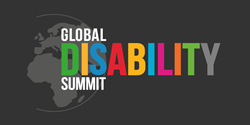
The Global Disability Summit
“The pandemic not only deprioritised lives and rights of persons with disabilities, not only pushed millions of persons with disabilities into poverty, but also reminded us that discrimination is very present with us,” said Yannis Vardakastanis, President of the International Disability Alliance.
GENEVA (PRWEB)
February 17, 2022
Governments and other organisations from around the world came together at the online event and pledged to improve the lives of people with disabilities. Many announced new policies and funding. While the first Summit in 2018 was a real pacesetter with over 400 participants and 968 commitments, the second Summit is taking this higher and further, with more than 7000 participants and more than 1250 commitments.
-
By the end of the first day, commitments were made by more than 10 countries towards disability rights. - Speakers included the hosts, the Governments of Norway and Ghana and the International Disability Alliance (IDA); the Secretary General of the United Nations (UN), António Guterres; and representatives of 17 governments.
- Seven UN agencies attended and committed to change the way they include people with disabilities into their work.
The virtual two-day Summit is the world’s biggest gathering of global leaders and disability rights activists and organisations dedicated to commit to change for people with disabilities. It is a vital opportunity for commitments to improve the rights of the world’s one billion people with disabilities, who were disproportionately affected by the COVID-19 pandemic.
On the first day participants discussed the rights and priorities of people with disabilities in areas ranging from humanitarian disasters and climate change to employment and sexual and reproductive rights.
Some of the key commitments made were:
- The USA made 23 commitments on disability rights. This is the first time the country has made commitments at the Summit. USAID Administrator, Samantha Power said, “As we continue to build back better, we will ensure that we deal everybody in and bring everyone along”.
- Norway launched its first disability inclusion strategy, including increasing opportunities for people with disabilities in the job market and their priorities in disaster risk reduction and climate change adaption. It also pledged to include disability legislation in its domestic law.
- The UK’s Foreign and Commonwealth Office announced 18 new commitments including a new disability inclusion strategy up to 2030 and funding for the Global Action on Disability (GLAD) Network.
- Australia will develop a new policy to promote and protect the human rights of all people with disabilities, including through its development cooperation programme.
- Malawi committed to adopt a Zero Rejection Policy at all levels of education in-line with provisions of the Disability Act, the Malawi Constitution and the UN The Convention on the Rights of Persons with Disabilities (CRPD) by 2022.
- Denmark will work to combat gender-based violence in crises. As the global lead of Call to Action on Protection Against Gender-Based Violence in Emergencies 2021-2022, Denmark is committed to advocating for the inclusion of people with disabilities in efforts against gender-based violence in humanitarian contexts.
- The European Union promised €5 million in funding for the UN Partnership on the Rights of People with Disabilities (UNPRPD).
- IDA committed to promoting leadership of underrepresented groups of persons with disabilities and to delivering technical assistance on disability-inclusive development and humanitarian action to donors and the UN system.
- Save the Children made 12 new commitments including to support organization of children and youth with disabilities to strengthen and amplify their self-advocacy, to engage in public policy discussions and to become partners in their own right.
In his welcome to the Summit, Jonas Gahr Støre, Prime Minister of Norway said, “If the Sustainable Development Goals are to be achieved – and they are to be achieved – social and economic development must be rights based and disability inclusive. We must leave no-one behind”.
The President of Ghana, Nana Akufo-Addo, added that inclusion of people with disabilities “cannot just be about economics. It has to be about equality and social justice, and above all, it must be about our humanity… We must tackle disability exclusion head on and do so with a sense of emergency”.
Yannis Vardakastanis, President of IDA, outlined the relevancy of the Summit by saying, “the pandemic not only deprioritised lives and rights of persons with disabilities, not only pushed millions of persons with disabilities into poverty, but also reminded us that discrimination is very present with us. Against this background we are gathering today and tomorrow to reposition disability rights once again on the right track”.
The second Global Disability Summit will continue tomorrow (17 February 2022). This year’s event is entirely virtual and is being live-streamed from Norway.
More information along with the up-to-date agenda can be found online, and anyone can take part in the Summit at: http://www.globaldisabilitysummit.org
For updates and live announcements follow us on Twitter at: @GDS_Disability, #CommitToChange and #GDS2022
Share article on social media or email:

